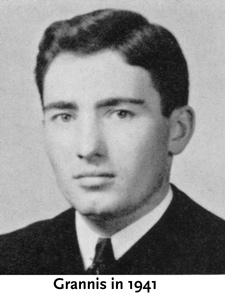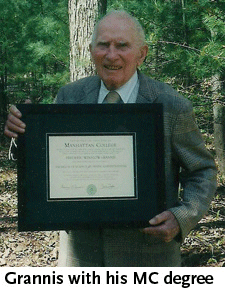He is 93 and frailer now, but Fred Grannis ’12 still leads an active cycling lifestyle, pumping his pedals up to 20 miles a day near his home in Pennsylvania’s Pocono Mountains. At the peak of his competitive cycling career, he ascended Mt. Washington in New Hampshire, New England’s tallest mountain.
“It took a while, but I made it to the top,” says Grannis in retrospect.
The same might be said for Grannis’ undergraduate journey. After being drafted by the U.S. Army as a Manhattan College senior in the spring semester of 1942 — just two months and 15 academic credits shy of graduation — the young veteran returned to New York nearly four years later, unable to re-register for the classes he’d left behind.
Grannis would go on to lead a full life, including going to law school and fathering three children during a 59-year marriage to his wife, Mary Turner. He accelerated through the business ranks and became the chief examiner at the New York Stock Exchange without the benefit of a college diploma. Still, without that recognizable piece of paper, there was always something missing from his portfolio of achievements.
Seventy years later, thanks to a persistent son, an understanding college administrator and the enduring grit that only a long-distance cycler could posses, Grannis closed in on another finish line.
WWII Preempts Graduation
 Grannis was born in 1920, a seventh-generation American whose ancestors arrived in Connecticut in 1644, not long after the Mayflower sailed into port. The family eventually settled in Shore Acres, Staten Island, a stone’s throw from the future site of the Verrazano-Narrows Bridge.
Grannis was born in 1920, a seventh-generation American whose ancestors arrived in Connecticut in 1644, not long after the Mayflower sailed into port. The family eventually settled in Shore Acres, Staten Island, a stone’s throw from the future site of the Verrazano-Narrows Bridge.
After high school, he enrolled in Manhattan College’s satellite campus in Staten Island and, beginning junior year, became a resident student at the College’s Riverdale campus, where he was a business administration major.
In early 1942, after the attack on Pearl Harbor, thousands of college men entered the draft. Many students were able to defer their enlistments until after graduation, but for about 64 Manhattan students, including Grannis, Uncle Sam wouldn’t wait. In March, Grannis left the Riverdale campus for field artillery training on a U.S. Army base in Oklahoma.
“I’m a laid-back kind of guy, so I didn’t make too much of a fuss over it,” Grannis says.
For the next three years, Grannis would churn through officer candidate training, various flight schools and finally the U.S. Army Air Corps, where he was promoted to first lieutenant and became a B-24 bomber command pilot.
After the war, Grannis returned to Staten Island and approached Manhattan College, presuming he’d re-register for the classes he didn’t complete in the spring of 1942. But College officials told him there weren’t any slots available that fall, so his readmission would have to wait until the following semester.
“And that was the end of the conversation,” Grannis recalls. “So I went on with my life and did what was to be done. And I never held any grudges.”
A Son’s Idea
Three years ago, during a casual conversation with his son, Fred Grannis Jr., Grannis Sr. casually mentioned that he’d never actually graduated from Manhattan College.
“I said to myself, ‘Wow, I didn’t know that,’” Grannis Jr. recalls now. “My father had always talked about Manhattan College with such gratitude, and I assumed he’d graduated.”
 Grannis Jr. knew his father was too humble to approach Manhattan College on his own, so he wrote an email to a College administrator last May, outlining his father’s story. He concluded the message with an appeal:
Grannis Jr. knew his father was too humble to approach Manhattan College on his own, so he wrote an email to a College administrator last May, outlining his father’s story. He concluded the message with an appeal:
“This narrative history suggests that there is an opportunity for the College to recognize the contribution of those students who have served our nation in the military and were unable to return to complete their degree requirements.”
Grannis Jr.’s email was forwarded to Provost William Clyde, Ph.D. Recognizing that Grannis Sr. had completed 121 out of 136 credits, Clyde wondered whether his war-status might constitute as “life experience” for the basis of the additional credits.
“I read the son’s letter, and here is a guy about to graduate in good standing, and then Pearl Harbor happens,” Clyde recalls. “He shouldn’t be penalized for his patriotism on the precipice of graduating. He also went on to an advanced degree and successful career, doing exactly what he should have been doing with his Manhattan experience. So this was a chance to do something right, close the loop and finish what should have been.”
Clyde consulted with several other college administrators and last fall, a diploma for Frederic Winslow Grannis was drafted with a conferral date of Sept. 1, 2012. A few weeks later, it arrived in a FedEx package at Grannis’ Pennsylvania home.
Now, when he looks up from his favorite chair in his living room as he’s doing crossword puzzles or punching the keys of a laptop, Grannis sees his new diploma on the wall standing out among his other mementos.
“It’s nice to look at it,” he concedes. “And if I want to brag to somebody that I’m a college graduate, I can do that now.”